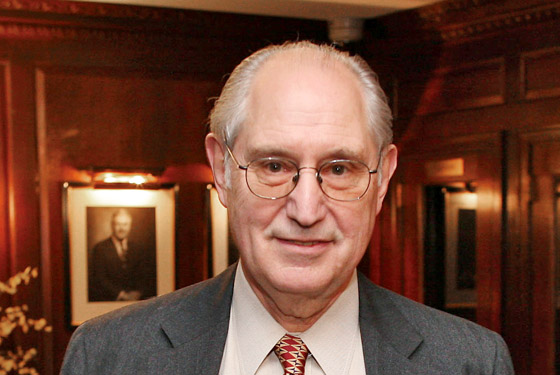Profile: Edward Hoyt
"A grounding in the humanities and arts helps MIT students serve the world with wisdom, confidence, and skill."

Edward Hoyt, Founder, Hoyt Humanities Fund
by Susan Saccoccia
When Ed Hoyt ’57 graduated with a degree in chemical engineering, he did not envision a career in banking. But during a post-graduate year at MIT, he became intrigued by the challenges of overseas economic development. Ed obtained a PhD in international economics from Tufts University and then spent three decades in the international division of Morgan Guaranty Trust. He retired in 1995 after running the bank’s subsidiary in Amsterdam, directing its business in parts of Central and South America and heading its office in Singapore.
The Effect of 20th Century Novelists
In no small way, Ed credits his success in global business management and his abiding interest in literature to undergraduate courses he took at the School. “The professors opened me to a whole area of insight that has stayed with me throughout my life,” says Ed, who with his wife Sarnia now lives in New York City. One especially memorable course explored twentieth-century American novelists. “We probed layer after layer of the text, following its multiple threads,” says Ed, “I never realized that you could do that with a piece of literature. It was engineering of a different sort.
“Studying Faulkner and Hemingway,” Ed continues, “I learned to appreciate meanings that lie beneath the surface. This skill was critical in helping me understand the cultural differences among people, an important ability when managing a global enterprise.”
Grateful for his experience, Ed supports his alma mater by directing his giving to the humanities. “MIT has a crucial role to play in solving the world’s problems,” he says. “A grounding in the arts, humanities and social sciences develops the capacity to communicate ideas and manage solutions—skills that are necessary to make great ideas work in the world.”
Founding the Hoyt Humanities Fund
The year after he retired, Ed established the Hoyt Humanities Fund, which enables the dean to support emerging opportunities that benefit faculty and students. Ed and Sarnia regularly host dinners that introduce MIT alumni to distinguished humanities and arts professors. The guest speaker at the November 2008 dinner was Institute Professor John Harbison, a Pulitzer Prize winning composer. “Alumni learn about innovative programs,” says Ed, “and experience the quality and charisma of the School’s faculty.”
In 2007, Ed created the Hoyt Fellowship Fund, an endowment to support students in the Graduate Program in Science Writing, which prepares writers to advance public discourse in science, medicine and technology.
As a member of the Humanities Visiting Committee, Ed finds that undergraduates value the School’s courses, which broaden their perspectives, and capacity to serve the world. “These young people know that they will contribute to some of the most important advances of our time,” says Ed. “They see the links between their specialties and other fields, and they want to understand and shape the societal implications of their work.” ∎
Susan Saccoccia is a freelance writer and essayist who focuses on work for education and nonprofit organizations.
Learn More
To learn more about making gifts to the School, contact Anne Marie Michel, Assistant Dean for Development, by phone (617.253.4075) or e-mail (ammichel@mit.edu).